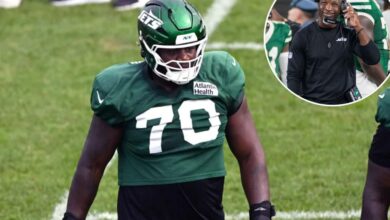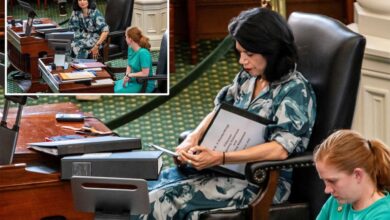Journalist survived on his own urine after falling down cliff during hike

Climate journalist Alec Luhn survived six harrowing days stranded in Norway’s wilderness with a broken leg by drinking his own urine, eating grass and moss and even popping a blister to drink his own blood.
The 38-year-old American plunged down a steep mountain face in Folgefonna National Park on July 31, shattering his femur in two places, fracturing his pelvis in three spots and breaking about half a dozen vertebrae.
The ordeal began when Luhn decided to extend a family vacation in Bergen for the solo glacier hike.
Near the trail’s summit around 10 p.m., he noticed his left boot sole starting to separate but continued hiking in the still-bright Norwegian summer sun.
“I just took a wrong step. I don’t remember exactly how it happened, but I took a step and slipped and started sliding,” he explained to the Washington Post.
Luhn lost his cellphone, water bottle and most of his food during the terrifying fall while hiking alone to see one of Norway’s largest glaciers.
“I remember thinking, ‘This is really bad. This is the start of the disaster movie,’” Luhn told CNN’s Anderson Cooper.
“This is that moment where everything goes really, really wrong.”
The experienced outdoorsman, who has reported from remote locations including Siberia and the Arctic Ocean, told WaPo that he found himself facing the ultimate survival test when he regained consciousness the next day.
“I just remember sliding down the mountain at first, and then spinning down the mountain, rolling down the mountain, and then just pinballing down the mountain,” he told CNN.
When the fall finally stopped, Luhn realized the devastating extent of his injuries. His left femur had snapped completely, leaving his foot dangling around uselessly.
“My left foot was just flopping around with no direction,” he said. “I was basically immobilized.”
His wife Veronika Silchenko had flown home to England expecting not to hear from him until Aug. 4, knowing cellphone service would be spotty during his planned four-day solo trek.
Unable to move up the mountain to search for his lost phone, Luhn rationed the few snacks remaining in his backpack while eating whatever vegetation he could find nearby.
After two days without water, desperation set in. The granola bars and peanuts in his pack felt like “concrete” paste that he couldn’t swallow due to his parched throat.
“I was so desperate for any kind of liquid that I popped a blister on my hand to drink the blood,” he revealed.
Remembering childhood warnings that three days without water could prove fatal, Luhn reluctantly urinated into an empty water pouch and drank minimal amounts to survive.
When rain finally arrived on the third day, he collected every precious drop by sucking water from the creases of his sleeping bag.
“It was the best thing I ever tasted,” he said with a laugh.
But the rain brought new dangers. Luhn got soaked and cold, struggling to stay warm in his makeshift shelter constructed from a tent pole and rain jacket.
Meanwhile, Silchenko couldn’t eat or sleep as worry consumed her after reporting her husband missing on Aug. 4.
“I knew that he would do everything he could to wait for us to rescue him,” Silchenko, also a journalist, told the Washington Post.
“I didn’t doubt that for a minute because he’s very strong, mentally and physically.”
Search-and-rescue teams battled constant rain and wind that made their mission nearly impossible. Low-hanging clouds on Aug. 5 left Luhn wondering if he would survive.
“This actually might be it. I might not make it through this,” he thought as the clouds merged indistinguishably with the mountain peaks around him.
Rescuers finally located Luhn on Aug. 6 and rushed him to the hospital, where doctors discovered severe frostbite on his feet alongside his multiple fractures.
Despite the extensive injuries, doctors believe he will make a full recovery after a long rehabilitation process.
True to his journalistic instincts, Luhn immediately asked for pen and paper upon reuniting with his wife to document his survival story.
The harrowing experience gave him time to reflect on what truly mattered.
“I spent a lot of time thinking about my wife and my family and how silly it was that here I was possibly going to die because I wanted to do a cool hike around this glacier,” he said.
Silchenko remains confident her husband will return to hiking once he recovers, but with one crucial condition.
“He is definitely not hiking alone. He’s banned from solo hiking,” she said with a laugh.
Credit to Nypost AND Peoples



